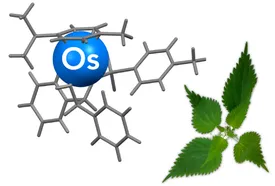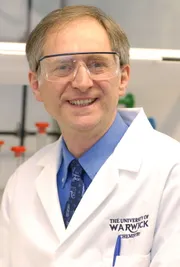You've helped us find a new way to attack cancer
 Thanks to your donations, our researchers have discovered that we can destroy cancer cells more effectively and selectively with a unique new reusable treatment, activated with a substance found in stinging nettles and ants.
Thanks to your donations, our researchers have discovered that we can destroy cancer cells more effectively and selectively with a unique new reusable treatment, activated with a substance found in stinging nettles and ants.
Led by Professor Peter Sadler from the Department of Chemistry, researchers have developed an organic-osmium compound, which is triggered using a non-toxic dose of sodium formate, a natural product found in many organisms, including nettles and ants.
Named JPC11, it targets a metabolic process which cancer cells rely on to survive and multiply. It does this by converting a key substance, used by cancer cells to provide the energy they need for rapid division, into an unnatural lactate leading to the cells’ destruction.
Uniquely, this treatment can be recycled and reused within a cancer cell to attack it repeatedly. This unprecedented ability could lead to future anticancer drugs being administered in smaller, more effective, and potentially less toxic doses - decreasing the side-effects of chemotherapy.
The researchers have been focusing on the potential to use this compound on ovarian and prostate cancers. Ovarian cancers are becoming increasingly resistant to existing chemotherapy drugs (such as the platinum drug, cisplatin). Since this new research functions in a totally new and unique way, it may overcome this acquired resistance.
Importantly, the development opens up a possibility for a more selective cancer treatment as JPC11 was observed to specifically target the biochemistry of cancer cells, leaving healthy cells largely untouched. This is another improvement compared to existing platinum-based drugs, which can also attack non-cancerous cells causing side-effects.
 Professor Peter Sadler commented:
Professor Peter Sadler commented:
Platinum compounds are the most widely used drugs for cancer chemotherapy, but we urgently need to respond to the challenges of circumventing resistance and side-effects. Our lab is focussed on the discovery of truly novel anticancer drugs which can kill cells in totally new ways. Chemo-catalysts, especially those with immunogenic properties, might provide a breakthrough.
It will take time to progress from the lab to the clinic, but we are fortunate to have a talented enthusiastic, international team working with colleagues in Warwick Cancer Research Centre across the borderlines of chemistry, cell and systems biology and cancer medicine who are determined to succeed.
